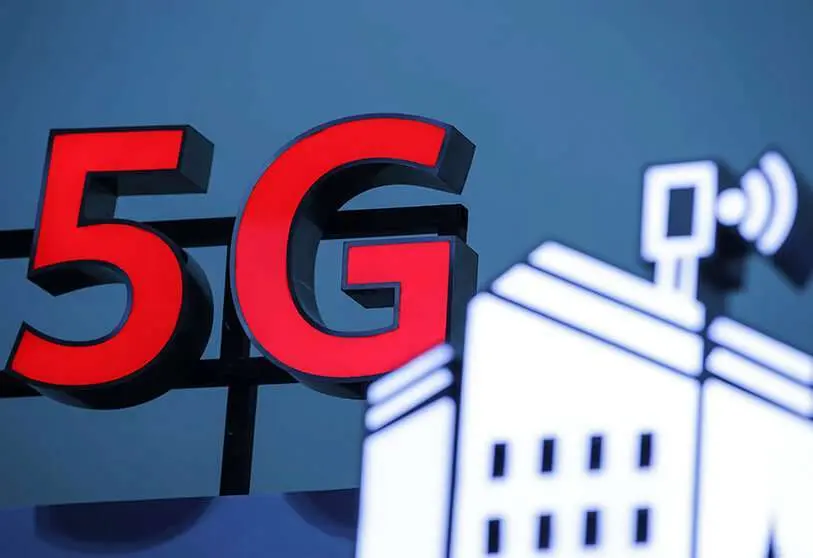Could a shift to 5G boost recovery in the face of Gulf COVID-19?

With connectivity widely recognised as a key driver of post-coronavirus economic recovery, Gulf Cooperation Council (GCC) countries are poised to benefit from the expansion of their 5G networks.
Earlier this month, the UAE unveiled its "Industry 4.0" initiative, which aims to increase innovation and productivity, reduce the carbon footprint of the industrial sector and add some $6.8 billion to the economy by 2031.

Industry 4.0 is a cornerstone of the government's roadmap to ensure the economy remains dynamic over the next half century. The plan will leverage Fourth Industrial Revolution technologies such as automation, additive manufacturing, blockchain, artificial intelligence (AI) and the Internet of Things (IoT).
In the UAE, as elsewhere, these technologies often rely on 5G connectivity to generate optimal value. For this reason, a significant aspect of Industry 4.0 is a plan for Abu Dhabi-based ICT giant Etisalat to expand 5G coverage in the country, in partnership with Swedish multinational Ericsson, which has been working in the UAE since the 1970s.
In fact, 5G deployment in the UAE is already underway, thanks in part to Etisalat's efforts to develop ICT infrastructure: the country has the fastest mobile network in the world and the fastest fixed network in the GCC. It has also had the highest fibre-to-the-home (FTTH) penetration rate in the world for three years.

Ericsson has highlighted that one area where 5G could add significant value is smart agriculture in Al Ain, where industrial farmers are keen to drive digitalisation, for example by expanding the use of remote sensors and robotics.
This is just one of the ways in which 5G can potentially make industry more sustainable and productive in the region.
"Increasingly, customers want to feel part of sustainability efforts and that these efforts lead to tangible realities. In this regard, 5G can be a key enabler, thanks to the decentralised control and monitoring it can provide across facilities and systems," Feras Albanyan, interim CEO of real estate development company Aqalat, told OBG.
The UAE is not the only GCC member to have turned its attention to 5G.
Several GCC countries, including Saudi Arabia, began expanding 5G coverage in 2019, while in a recent report Ericsson anticipated that 5G will account for 73% of all mobile subscriptions in the GCC by 2026. This will represent the second highest 5G market penetration in the world.
Salam Saudi Arabia, known as Integrated Telecom Company until June this year, is committed to the expansion of 5G and FTTH in the Kingdom, in line with Vision 2030 digital transformation plans.

"As an increasing number of devices are connected to 5G networks, the improved connectivity and higher speeds will generate a huge amount of data. This will lead to new insights and functionalities through artificial intelligence-based analytics and cloud services," Essam Alshiha, CEO of Saudi Business Machines, told OBG.
Despite this momentum, there are certain question marks associated with the wholesale launch of 5G.
"5G is far superior to 4G, but operators are often trapped by a purely marketing-driven approach to 5G investments," Osama al-Dosary, chief executive of Salam, told OBG. "The fear of telecoms services being perceived as utilities creates enormous pressure on operators to look for ways to differentiate themselves. However, it is important to avoid a disconnect between the marketing discourse on what 5G means in terms of additional functionalities and the actual return on investment."
A cautionary tale in this regard comes from China, where, after years of investment, many of the major 5G operators have recently begun to brand and focus on commercial applications that can be replicated at scale.

Another challenge is the perennial issue of ICT infrastructure and access. "While many cloud services only require 4G connectivity, the fusion of cloud computing and IoT can be a growth driver. However, this depends on telcos being able to deliver large-scale 5G connectivity in a financially sustainable way, which remains a challenge in Oman and elsewhere," Maqbool al-Wahaibi, CEO of Oman Data Park, told OBG.
Finally, there are some doubts about whether customers themselves appreciate the benefits of 5G.
For example, a recent survey found that US consumers were largely ambivalent about 5G, with 67 per cent saying they are unlikely to switch from 4G, and a further 19 per cent saying they simply don't care.
It remains to be seen whether 5G will face similar issues in the GCC, although it should be noted that the region already leads the world in terms of internet usage: at the end of 2020, it had the highest average monthly data traffic per smartphone in the world.








